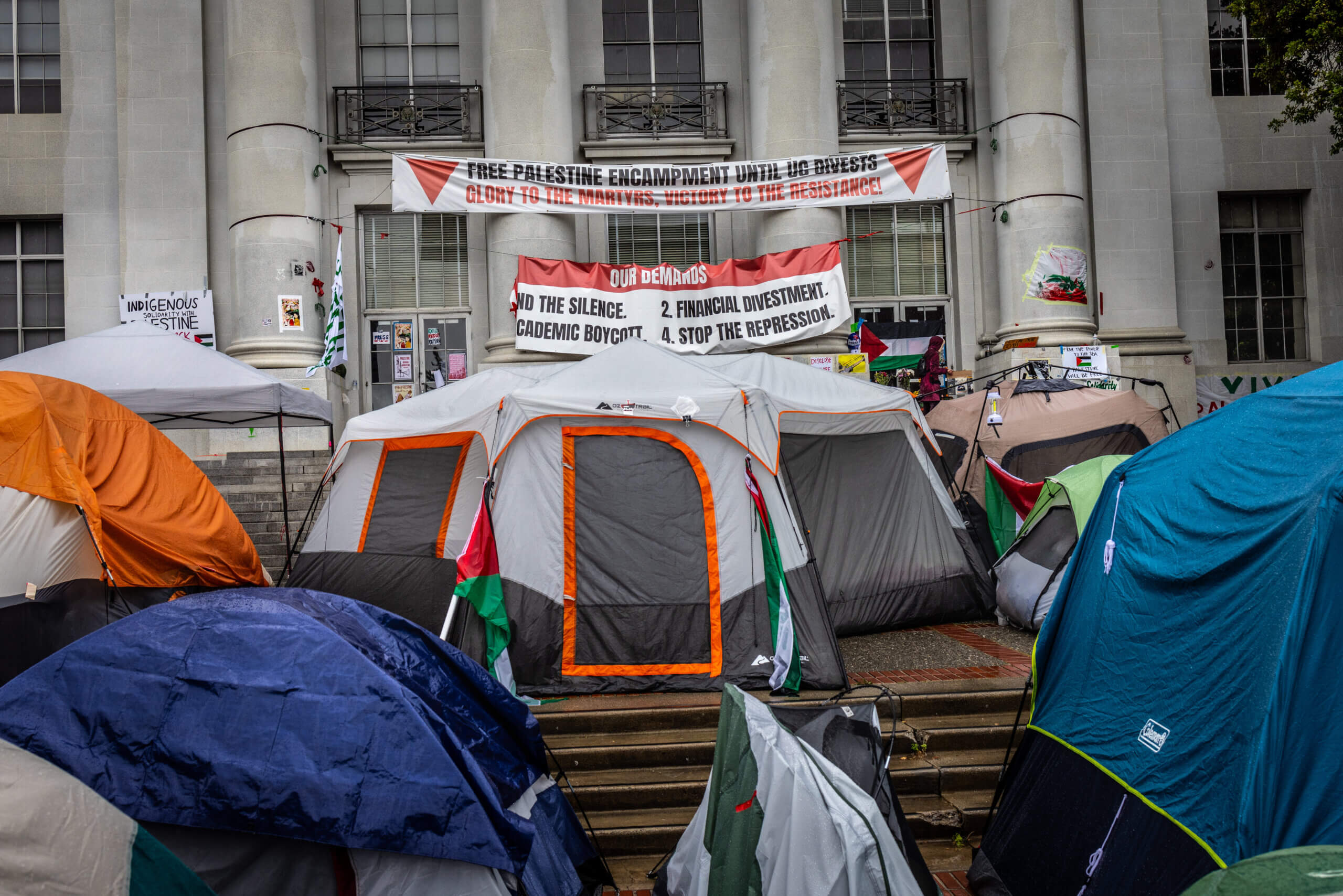As fall semester begins, University of California system takes a tougher tack on student protesters
New UC policies ban encampments and, to some extent, masked protesting

Banners and posters of pro-Palestinian support on the campus of the University of California, Berkeley, on May 4. Photo by Jay L. Clendenin/Getty Images
When students started pitching tents on University of California campuses last April to protest Israel’s war in Gaza, school officials took a variety of approaches to get rid of them. Some hoped to wait out the encampments. Others tried to negotiate. Most called the cops.
But this fall, those officials will have a playbook for dealing with encampments — or rather, a single play — and neither patience nor compromise is involved. The president of the UC system directed member schools Monday to ban setting up tents or any other temporary structures on school property, part of a new set of policies related to campus protests.
Introduced two days before fall semester begins at UC Berkeley and UC Merced — the other eight campuses start next month — the new rules also forbid wearing masks to conceal one’s identity; blocking walking paths and building entrances; building unauthorized structures on school property; and refusing to reveal one’s identity to university officials while on school property.
UC President Michael Drake said in an Aug. 19 letter announcing the policies that they were designed to promote “an environment that balances free expression with safety and orderly campus operations.”
Drake’s letter came in the wake of pro-Palestinian protests across the UC system during the spring that led to the arrests of hundreds of students, tens of millions of dollars in damage and in one high-profile incident, violence against student protesters. And it responded to pressure from state lawmakers — in the form of a $25 million hold on the school system’s budget — to enforce preexisting university policies pertaining to campus activism.
Members of the pro-Palestinian protest movement said the new rules were a targeted attack against them. Banan Abdelrahman, a spokesperson for the UC Berkeley chapter of Students for Justice in Palestine, called the policies a “desperate effort” to break the will of their movement in a statement to the Daily Californian, the school’s student newspaper.
When they began appearing on college quads in late April, pro-Palestinian tent encampments put administrators at UC schools in a bind they had not faced in the previous six months of campus demonstrations. Ordering their removal would mean calling law enforcement to arrest students for peaceful protest in a public space. But tolerating the encampments, which eventually appeared at all 10 UC campuses, came with its own costs: the system eventually reported a total of $29 million in damage related to pro-Palestinian protests.
And while encampments, whose occupants demanded divestment from Israel and the shuttering of study abroad programs there, were disbanded peacefully at a few of the universities — UC Riverside reached a compromise with protesters that included “an ongoing review of Sabra Hummus” — others culminated in violence. In an ugly scene broadcast around the world, pro-Israel agitators attacked UCLA’s encampment April 30 after it had been up for six days; hundreds of police officers in riot gear descended on the quad the next night to dismantle it.
Attempts to let encampments stand at other UC campuses usually led to law enforcement being called. Officers from 10 different nearby police agencies were dispatched to UC Irvine May 15 to clear an encampment that had stood for two weeks after student protesters also occupied a lecture hall. UC San Diego Chancellor Pradeep Khosla said the school’s encampment tripled in size before he ordered it dismantled.
While Drake’s letter said camping on university property was prohibited “unless specifically pre-approved,” a member of the UC Board of Regents, which sets policy for the school system, said no encampment would ever be approved.
“We’re really looking at zero tolerance on that,” Rich Leib, who has served on the board since 2018 and is its former president, said in an interview.
Leib said he anticipated the protest movement being just as active this fall, with the war in Israel approaching its one-year anniversary. Palestinian authorities say more than 40,000 people have died in Gaza since Oct. 7, the majority of them civilians.
The UC system, which enrolls about 280,000 students systemwide, joins the California State University system (some 430,000), which banned encampments and masks last week.
Pro-Palestinian protesters said the decision to ban protest tactics that had been tolerated in previous protest movements betrayed the school system’s bias against the Palestinian cause.
“If this was a different cause, would the reaction be the same? That is what’s concerning to me,” Sarah Bacon, a UCSB graduate student who joined the encampment at the school, told the Los Angeles Times.
Responding to that charge, Leib said that previous campus protest movements, like Occupy Wall Street in 2011 and the Vietnam War before that, were different in nature from the pro-Palestinian movements.
“This is about harassing — discriminating against students — and we never had that before,” Leib said.
A message from our Publisher & CEO Rachel Fishman Feddersen

I hope you appreciated this article. Before you go, I’d like to ask you to please support the Forward’s award-winning, nonprofit journalism so that we can be prepared for whatever news 2025 brings.
At a time when other newsrooms are closing or cutting back, the Forward has removed its paywall and invested additional resources to report on the ground from Israel and around the U.S. on the impact of the war, rising antisemitism and polarized discourse.
Readers like you make it all possible. Support our work by becoming a Forward Member and connect with our journalism and your community.
— Rachel Fishman Feddersen, Publisher and CEO



























